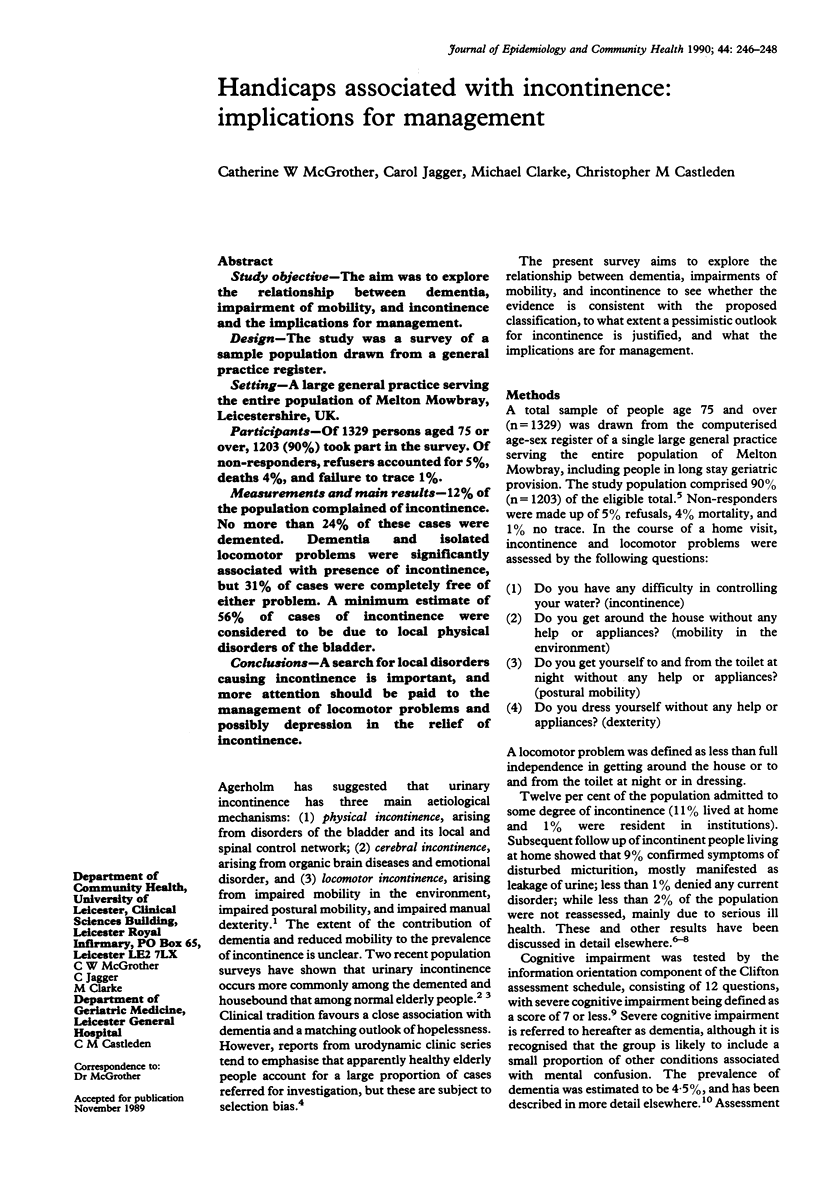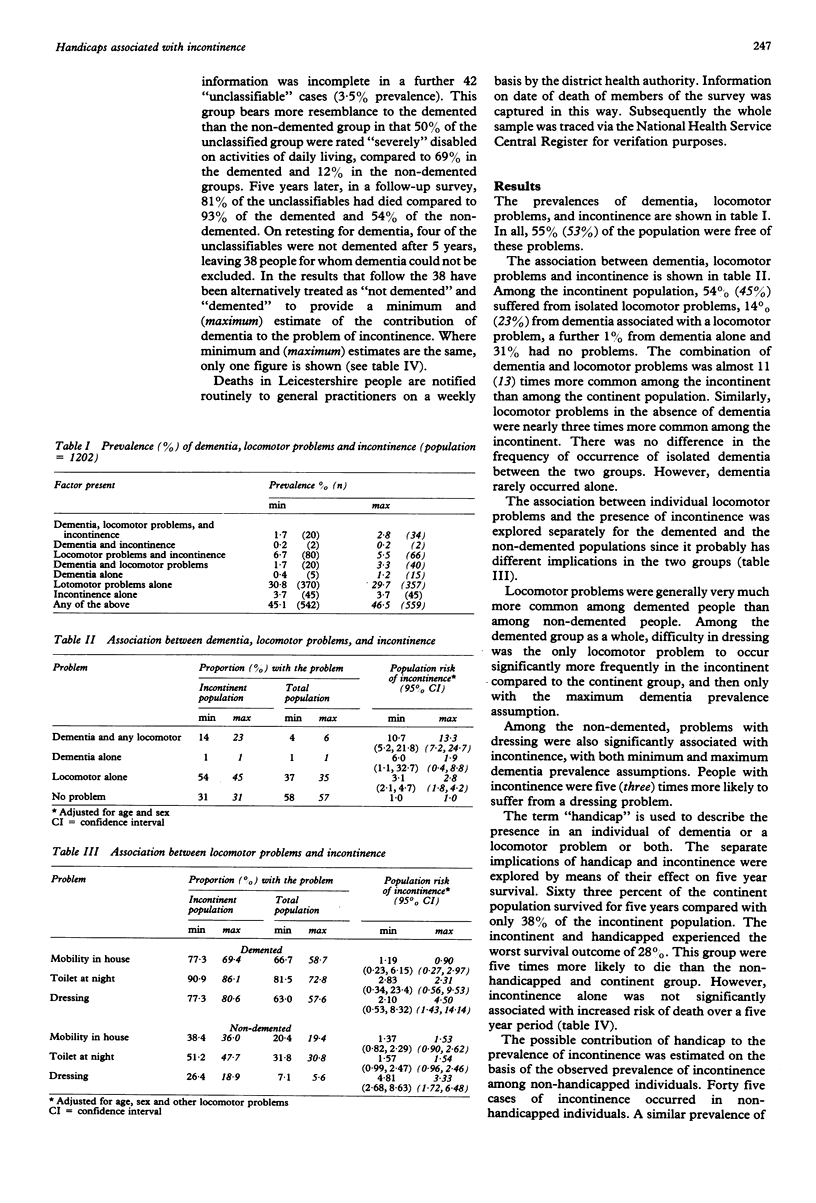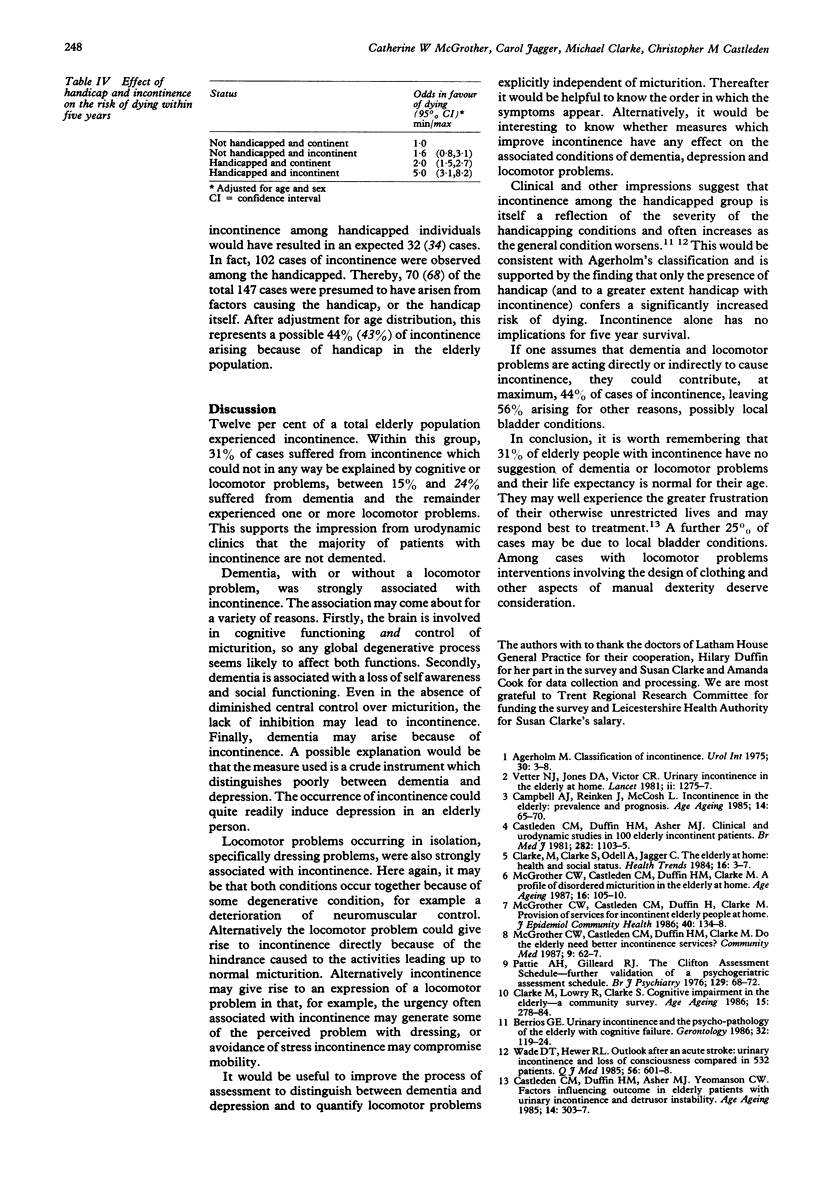Abstract
STUDY OBJECTIVE--The aim was to explore the relationship between dementia, impairment of mobility, and incontinence and the implications for management. DESIGN--The study was a survey of a sample population drawn from a general practice register. SETTING--A large general practice serving the entire population of Melton Mowbray, Leicestershire, UK. PARTICIPANTS--Of 1329 persons aged 75 or over, 1203 (90%) took part in the survey. Of non-responders, refusers accounted for 5%, deaths 4%, and failure to trace 1%. MEASUREMENTS AND MAIN RESULTS--12% of the population complained of incontinence. No more than 24% of these cases were demented. Dementia and isolated locomotor problems were significantly associated with presence of incontinence, but 31% of cases were completely free of either problem. A minimum estimate of 56% of cases of incontinence were considered to be due to local physical disorders of the bladder. CONCLUSIONS--A search for local disorders causing incontinence is important, and more attention should be paid to the management of locomotor problems and possibly depression in the relief of incontinence.
Full text
PDF


Selected References
These references are in PubMed. This may not be the complete list of references from this article.
- Agerholm M. Classification of incontinence. Urol Int. 1975;30(1):3–8. doi: 10.1159/000279951. [DOI] [PubMed] [Google Scholar]
- Berrios G. E. Urinary incontinence and the psychopathology of the elderly with cognitive failure. Gerontology. 1986;32(2):119–124. doi: 10.1159/000212775. [DOI] [PubMed] [Google Scholar]
- Campbell A. J., Reinken J., McCosh L. Incontinence in the elderly: prevalence and prognosis. Age Ageing. 1985 Mar;14(2):65–70. doi: 10.1093/ageing/14.2.65. [DOI] [PubMed] [Google Scholar]
- Castleden C. M., Duffin H. M., Asher M. J. Clinical and urodynamic studies in 100 elderly incontinent patients. Br Med J (Clin Res Ed) 1981 Apr 4;282(6270):1103–1105. doi: 10.1136/bmj.282.6270.1103. [DOI] [PMC free article] [PubMed] [Google Scholar]
- Castleden C. M., Duffin H. M., Asher M. J., Yeomanson C. W. Factors influencing outcome in elderly patients with urinary incontinence and detrusor instability. Age Ageing. 1985 Sep;14(5):303–307. doi: 10.1093/ageing/14.5.303. [DOI] [PubMed] [Google Scholar]
- Clarke M., Clarke S., Odell A., Jagger C. The elderly at home: health and social status. Health Trends. 1984 Feb;16(1):3–7. [PubMed] [Google Scholar]
- Clarke M., Lowry R., Clarke S. Cognitive impairment in the elderly--a community survey. Age Ageing. 1986 Sep;15(5):278–284. doi: 10.1093/ageing/15.5.278. [DOI] [PubMed] [Google Scholar]
- McGrother C. W., Castleden C. M., Duffin H., Clarke M. A profile of disordered micturition in the elderly at home. Age Ageing. 1987 Mar;16(2):105–110. doi: 10.1093/ageing/16.2.105. [DOI] [PubMed] [Google Scholar]
- McGrother C. W., Castleden C. M., Duffin H., Clarke M. Do the elderly need better incontinence services? Community Med. 1987 Feb;9(1):62–67. doi: 10.1093/oxfordjournals.pubmed.a043907. [DOI] [PubMed] [Google Scholar]
- McGrother C. W., Castleden C. M., Duffin H., Clarke M. Provision of services for incontinent elderly people at home. J Epidemiol Community Health. 1986 Jun;40(2):134–138. doi: 10.1136/jech.40.2.134. [DOI] [PMC free article] [PubMed] [Google Scholar]
- Pattie A. H., Gilleard C. J. The Clifton Assessment Schedule - further validation of a psychogeriatric assessment schedule. Br J Psychiatry. 1976 Jul;129:68–72. doi: 10.1192/bjp.129.1.68. [DOI] [PubMed] [Google Scholar]
- Vetter N. J., Jones D. A., Victor C. R. Urinary incontinence in the elderly at home. Lancet. 1981 Dec 5;2(8258):1275–1277. doi: 10.1016/s0140-6736(81)91504-x. [DOI] [PubMed] [Google Scholar]
- Wade D. T., Hewer R. L. Outlook after an acute stroke: urinary incontinence and loss of consciousness compared in 532 patients. Q J Med. 1985 Sep;56(221):601–608. [PubMed] [Google Scholar]


